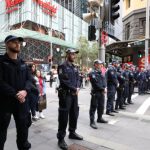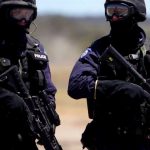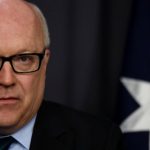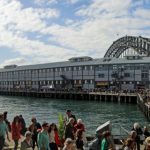NSW Government Continues to Remove Legal Safeguards and Protections

The NSW Coalition government is continuing its ongoing assault on civil liberties under the guise of combating terrorism. On October 4, NSW premier Gladys Berejiklian announced her government will be introducing the “nation’s toughest terror laws.”
Set to be introduced in November, the new laws will allow for the extended detention or supervision by authorities of inmates convicted of terrorist offences for up to five years after the term of their prison sentence has expired, if they’re considered to be a continuing threat to the public.
In a media release, the premier’s office stated the laws “will be modelled on NSW’s existing post-sentence scheme for high-risk violent and sex offenders.” Currently, six offenders are being detained under this post-sentence regime and another 70 are on extended supervision orders.
A broad reach
NSW Corrective Services commissioner Peter Severin said the measures will not affect a large number of inmates. He said that most terrorism offenders were already serving long prison sentences, and he could not identify anyone that post-sentencing detention would apply to at present.
However, as outlined in the premier’s office statement the laws will apply to “any prisoner who poses a terror threat… irrespective of the offence for which they were imprisoned.” Indeed, these measures will apply to any inmate who is suspected of having been “radicalised” in prison.
An Orwellian measure
“Continuing detention powers aimed at “suspected” terrorists will not make us safer,” NSW Greens MLC David Shoebridge stated, “but will undermine efforts at rehabilitation and fundamental principles in the common law.”
According to Mr Shoebridge, these “thought crimes” will rely on the evidence of “prison officers with minimal regard to essential legal principles.” He warned that the proposed laws would threaten “the presumption of innocence and credible independent evidence.”
“There is a very real concern that these new powers could see individuals gaoled for an additional five years based on prison officers taking a dislike to them,” the NSW Greens justice spokesperson told Sydney Criminal Lawyers®.
NSW: the premier police state
Being the nation’s leader on laws which remove civil liberties in the name of a perceived terrorist threat is nothing new to NSW.
At the October 5 Council of Australian Governments (COAG) meeting, it was agreed that that a new federal law would be introduced allowing for terrorist suspects to be detained for up to 14 days without any charges being brought against them.
Described as “draconian” by civil liberty groups, this new law is actually modelled upon a NSW law that has been in place for quite some time. The NSW law was enacted post-September 11, under the Terrorism (Police Powers) Act 2002.
The NSW law allows police to apply for a preventative detention order to hold an individual in custody for up to 14 days without charge if they have a reasonable suspicion the person has or will engage in a terrorist attack, or has done something to prepare for such an attack.
No evidence is needed to detain the individual, and a person as young as 16 can be the subject of an order.
A steady erosion
In relation to a suite of new counterterrorism measures being introduced by COAG, Ms Berejiklian said on the day before the meeting that in supporting public safety “sometimes it means all of us have to give up a little bit of our civil liberties.”
However, each of these little bits of civil liberties that are sacrificed for a new law start to add up, especially when you consider the track record of the current NSW Coalition government.
“Over the last six years, civil liberties have been under consistent attack from this Liberal National government,” Mr Shoebridge said. He listed a number recent laws that have eroded citizen’s freedoms, and declared that NSW is “well and truly on the path to becoming a police state.”
Mounting control
On July 21 this year, NSW parliament rushed through a bill that effectively gave NSW police the power to shoot to kill without fear of prosecution. If the police commissioner declares an incident a terrorist act, police are now allowed to use lethal force, when it is deemed “reasonably necessary.”
And as Mr Shoebridge pointed out at the time, the wording of the legislation is so ambiguous, it basically allows police to apply this force to anyone present, not just alleged terrorists.
Two bills were enacted on May 4 last year, that further whittled away at civil liberties. The Organised Crime and Public Safety Act 2016 allows senior police to issue “public safety orders” without court oversight. These can ban a person from a place or an event for up to 72 hours a week.
While the Crimes (Serious Crime Prevention Orders) Act 2016 provides that courts can issue directives restricting several aspects of a person’s life – including employment, movement and association – all without proof that they committed or facilitated a crime.
And the list goes on…
The Investigative Detention Act 2016 amended the Terrorism (Police Powers) Act. It provides that a terror suspect can be held in investigative detention for up to 14 days without charge. Individuals as young as 14 can be detained. And police can question them for up to 16 hours a day.
And in mid-March last year, a range of anti-protest laws were passed. Largely geared to people protesting mines, the new laws expanded police powers to counter public protests, and introduced maximum penalties of up to 7 years for hindering the operations of a mine.
Until it’s gone
And as each of these new laws are passed, many are unaware of the impact they are having. NSW Chief Justice Tom Bathurst remarked last year that he’d counted 397 encroachments upon the legal protections of the presumption of innocence, the right against self-incrimination and client legal privilege.
“This Liberal National government has created a parallel criminal justice system based on rumour, innuendo, suspicion and prejudice,” Shoebridge continued. And he further stressed that “surrendering our freedoms in the name of the war on terror” is not leading to greater safety.
Indeed, the passing of draconian laws that rob the public of their freedoms is merely serving the purposes of any perceived terrorist threat. “We are letting terrorists win if just the fear of them makes us give up what makes us a free and fair democratic society.” Mr Shoebridge concluded.








